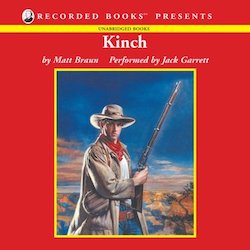the chat
in conversation with . . .
Jack Garrett
Among other accomplishments in his rich history, Jack Garrett ⏤ with Jill Scarcia ⏤ started our old Salon group all those years ago. High time we honored him a bit.
Actor, writer, voiceover artist: he’s the Jack of these trades, and he’s mastered each of them. He might be too humble to phrase it that way. But we’re not.
If you’ve never heard Jack’s voice, seek it out. Reward yourself. Plenty of links below to get you started. That voice is mellifluous, lyrical, confident, tender, polished, and curious, sometimes all in the same sentence. Oh, and he does a wicked-good Walter Brennan impersonation.
Recently, we sat down for a virtual chat with him. We learned about vinegaroons and bananas, grapes and Billy Graham, Rick Tragic, Dr. Byrum Upchuck, memories, and how we Googled it before the Internet existed.
Roswell

Ginger or Mary Ann?
Oh, Mary Ann, for sure. I actually got Mary Ann’s autograph without actually having been able to meet her. Which was sad, but somebody I knew was going to be able to see her. This was 30 years post-“Gilligan’s Island.” I thought Ginger could’ve been a guy in drag, as far as I was concerned. Mary Ann was beautiful, and she had a soul.
I thought you would be a Lovey guy. I thought you would pick Door Number Three.
[laughter]
No. But when you find a Lovey guy, remind me to stay away from him. Thurston Howell the Third, Jim Backus, was the voice of Mr. Magoo.
Wasn’t he in a James Dean movie, too?
Yeah, Rebel Without a Cause, I think. He played the dad. Pretty serious role.
What books are on your nightstand?
Right now, I’m reading an eBook of Henry Miller’s Sexus. And I’m also reading this book by Jon Savage, 1966: The Year the Decade Exploded, which is an interesting look at that particular time in the 60s, which meant a lot to me when I was a kid.
You can handle two books at a time?
Well, one’s fiction, one’s non-fiction.
I’m interested in your radio days. Angling toward your audio book work. Tell me about your DJ days.
I got into it because I was really into music as a kid and as an adolescent, so I listened to radio a lot. And then I heard about a 13-week school at a local radio station in L.A. I was sort of going nowhere, in dead-end jobs to pay the bills. I was also married. It was kind of a rough time.
[laughs]
Anyway, I went to this school, and at the end of it they had a placement program. When you start out in radio, you generally start out in small-town cities and work your way up. My first job was in Roswell, New Mexico. I packed up my shit and moved there. This is in 1976.
Do you remember your living situation in Roswell? Apartment? House?
Yeah, it was a house. It was unfurnished. I remember the floors were linoleum. And I had three cats. My wife had three cats, and so I inherited those. My wife was not with me because she was off at basic training. She’d joined the army reserve. So, I had one litter box for three cats. They made a travesty of this house. I had no furniture. Bought a hot plate. Didn’t even have a stove. I ate at the diner a lot. And I didn’t have a car. I had a tiny motor bike. So, it was an interesting time. And my first shift was the midnight-to-six shift.
How far away was the station from your house?
Not too far, maybe three miles. It was a country-western station. I didn’t know much about country music at all.
What was the name of the station? What were the call letters?
It was KRSY. The nickname was Krazy. Krazy Radio. Krazy twelve-thirty.
Did your show have a name?
No. My air name was Rick Tragic at the time.
[laughter]
Spelled as you would spell “tragic”?
Yes. And the way I got that: I happened to know somebody in L.A. whose name was Rick Tragic but it was Czech or something; he spelled it t-r-a-j-c-i-k or something weird like that. But I always like that name, so I just spelled it like an English word. And…there it went.
Okay, it’s been a great interview, Jack. Thanks so much for your time.
[laughter]
That’s the station where I discovered the vinegaroons. They crawled up out of the floor one night on my overnight shift. I swear to God, they looked like alien creatures. They’re called vinegaroons because when you step on them they smell like vinegar.
Yeah. And did it add some percussion to the country-western tunes you were playing?
[laughter]
No. But I was known to add stupid sound effects to songs I thought were less-than wonderful. And I got called on the carpet for that.
I picture you not just saying, “Here’s a song by Johnny Cash.” I picture you riffing a bit and talking about stuff.
Well, I would love to tell you that’s the truth, but I hadn’t really found myself as a confident creative person. So, I didn’t develop much of an air personality, unfortunately. I mainly just announced the songs. I learned a little bit about the artists, but I didn’t really say much. I did the commercials and the read-announcements. I’d read the news and the weather and that kind of shit. At a small station you did mostly everything.
Was it a call-in scenario, where people made requests?
Yes.
Any creepy “Play Misty for Me” situations?
Well…
[laughs]
…I don’t know how much I should tell you. There was one woman who called me. This was when I’d moved up to a day shift. I think it was the afternoon shift, maybe mid-day. She called a lot and asked for the song “Love in the Hot Afternoon” by Gene Watson, which is a pretty good song. And she was flirtatious, and so I flirted back. And one day, one of us said, well maybe we should meet. And we decided we’d meet in the parking lot outside of town. It turned out she was married. She was about 20 years older than me. Probably could’ve thrown me over her back and tossed me across the parking lot. And she stopped calling me after that.
Did the rendezvous move past the parking lot into, like, the Walmart?
[laughter]
No. I wasn’t interesting in getting serious. I do recall that we touched each other.
[laughter]
And it was sort of like touching a hot frying pan. Cast iron.
You know, for the intro, I’m going to write, “This interview has been dramatically edited.”
[laughter]
Thank you. You know how it goes: when you hear somebody’s voice on the phone, you imagine them. And then you see them. And I’m sure she had a picture of me very different from what she imagined, too. We both realized that as much as we were wanting to, we weren’t going to be able to do things.
Yeah, that’s fascinating. The projection. Because radio is a unique medium in that It allows you and invites you to create your visual narrative as you’re listening to the audio narrative.
Yes. And I think that’s a very positive attribute of it.
The DJ scenario as Rick Tragic. Life lessons? Did any of that experience inform your future work in audio books?
No. I got into radio, besides my love of music, because I had a good voice for it. I got into that school in L.A. based on an audition. So, I think that was the — well, later, while I was in radio, they started letting me do ad copy, some copy writing. And that at least started to stimulate the creative potential in me. Audio books came out of acting, which I did much later.
Nuns, bananas

Let’s circle back. Where were you born?
I was born in Westchester County, New York. My father worked in advertising. He took the train into NewYork City every day. A sort of a “Mad Men” kind of a setting, culture, in the 50s.
How long did you live in Westchester?
My mother left my father in ’61, I believe it was. I was six. I don’t remember a whole lot about those early years. But I do remember vaguely moving in a car cross-country to L.A.
Any early memories of New York City? Going into work with your dad?
I don’t remember doing that. I remember going with my mother. She would take me places. And I have vague memories of different people she knew, apartments. She ran with a sort of artistic crowd. I remember Central Park. She hired a photographer to do a photo shoot of me when I was four or five years old. Some of those pictures still exist. I have some vague memories. Nothing specific, like incidents.
You remember the drive across the country?
Yeah, I do because it was a sort of a sudden thing. My mother did it when my father was out of town, and my brother was home on spring break from college or prep school. We had a small sedan. So it was my brother, my mother, the maid who came with us, and the boxer dog. All in this car with all my mom’s possessions piled in among us. I was sort of squeezed between boxes in the back seat. I remember we stopped at Howard Johnson’s. I loved Howard Johnson’s. I can remember the way they looked.
At six years old, was that uprooting traumatic? Was there any immediate perspective on why you were going to California? Was it an exciting ride?
I don’t recall that it was traumatic. I don’t know if I understood or if I was even told. Before we got to L.A., we stopped in Phoenix, where my mother had a job doing a play for about a month. So, I remember a little bit of that. But I don’t remember any sort of emotional reaction.
Did the maid stay with you after you settled in Los Angeles?
[pause] Wow, that’s a good question.
Remember her name?
Uh…Leslie, I think was her name. I think she must have gone back because I don’t remember her in Phoenix or in L.A. I don’t know why she went with us to begin with, really. It’s kind of strange. Maybe my mother just hired her to go on the trip to help out. I don’t know.
You also have a sister.
Yes. She was either in college or…actually she was married by then and living in Germany, I think, temporarily.
What kind of schools did you go to in Los Angeles?
When we first got there, we lived with my aunt for a short time and I went to a local public school. And then my father moved out there to be near me, and my father was Catholic — not really a practicing one.
[laughs]
So, I went to a Catholic grade school.
Was it strict?
You know, I didn’t have anything to compare it to, so I don’t know. I think it was maybe moderately better education than the public schools at the time but not markedly so. There were nuns. The old-style nuns taught. Although there were some lay teachers, too.
I remember, the other day, I was having lunch at a place where they had brown paper bags on the table for you to take your face masks off and put them in the bag so they wouldn’t be sitting on the table. And the brown paper bag reminded me of when I had to brown-bag it to grade school. And one of the things you had to do after you finished lunch was tear open the bag, and the nuns would check every bag, to make sure you ate everything in your bag. Because to waste food was a sin. So, if you had like a nasty, bruised banana hidden there, you either had to hide it really well or you had to eat it.
[laughter]
I’m fascinated by sensory triggers. Your example is perfect.
Yeah. It came up totally out of the blue.
To me, it condenses the time-space continuum. You haven’t thought about that for years: are you having a memory of the moment? Or are you having a memory of the last time you remembered it? That’s a Eugène Ionesco question.
I think that’s been proven, actually, scientifically, that all our memories are memories of memories or memories of being told about something we experienced by someone who may have been more aware or was older at the time.
Right. Told that something happened, and you pull that into your narrative repertoire, like “The election was stolen from us,” and you buy it, hook, line, and sinker.
Yeah. Whether it was something you actually witnessed or not, you make yourself believe that.
Even if it’s been scientifically proven, and I can’t document this, but I’ve had memories that are so visceral that it’s just bringing me right back into that moment.
Oh, I’m sure there are those, too. I don’t doubt that.
It sort of supersedes that process of remembering the last time you remembered it or having other people in your family, your friends, impress upon you that this is what happened, and this is when it happened.
Yeah. With something especially traumatic or searing or just unusual, I can see that. The thing with the nuns, it wasn’t a specific incident I was remembering. It was something that happened every day, so that I was remembering the fact of it rather than the — although I do remember having to eat a really bruised banana once.
[laughter]
Are you cool with bananas these days?
Yes, they’ve gone a long way with packaging of bananas. They’re much less likely to come bruised. I don’t know if you remember bananas in the old days.
Well, all my banana experiences have pretty much been nun-proof.
[laughter]
I’m not accusing the nuns of deliberately bruising my banana. I’m not sure we need to take that any farther.
Any lasting friendships that have continued on from your Catholic school time?
No. In fact, one of my best friends, from grade school in L.A., I actually tried to look up when I was living out there, just a few years ago. I did the usual Internet search and I believed that I’d found him and the phone number, and I called the number and left a voicemail explaining who I was, literally 55 years later. And never heard back. Somehow, I got the sense, though, from looking at what I did find, that he’d come a long way down somehow.
[hearty laughter]
Which sounds ridiculous. I knew the kid when he was 11 years old.
[heartier laughter]
Well, I guess… his family was from Beverly Hills, they had money, you know…well-to-do. And his address was in a crummy part of Sherman Oaks. So, that’s what I meant.
He fell so far from sixth grade, huh?
He hit his pinnacle at age 11.
Did you ever get your knuckles rapped by any of the nuns?
No…but I did have a memory the other day. It’s interesting: you know how when you’re on the subway platform and a lot of the graffiti these days is a crude line drawing of a penis and balls? I remember one time in grade school, we had to cover all our books with book covers to protect them because we didn’t own them. We passed them along to the next year’s class. And on the book cover there was a standard thing, a cartoon picture of two kids with books. And I remember one day I was doodling on the cover, and I was drawing genitalia of a little boy and a little girl. And the nun came by and gasped and shamed me. I can’t remember what she said, but she didn’t strike me. I think I missed the golden age of corporal punishment in Catholic school. My father got some of it.

You made a nun gasp for all the wrong reasons.
[laughter]
Yeah. So I hope.
High school?
Well, I went to Loyola High School, which is a Jesuit Catholic high school, for two and a half years. Then I transferred middle of my junior year to public high school in West L.A. And then I dropped out.
Lee Baby Sims
Did you know you had a vocal talent? What prompted you to go to that radio station course?
The main impetus at the time was that I really was into music. There was a DJ at a local station. He has since become a kind of legend. He’s referenced in an early Jim Jarmush film. Lee Baby Sims was his usual air name. But at the time he was presenting himself as Ol’ Doc Frail, a veterinarian from Simi Valley who was just DJ’ing in his spare time. And he was so cool and so smooth and so kind of anti-usual DJ that it inspired me. I thought, Well, fuck, if some veterinarian can get on the air and do this, I certainly could. I’m not sure if I follow the logic in that, but he was an inspiration.
Jarmush’s Down By Law. Was that the Tom Waits character?
That’s the movie, for sure. Was that his character name in it?
Don’t know. I remember they’re in jail toward the beginning of the film and somebody says You’re not a DJ. Come on, give us a bit. And Tom Waits clears his throat and does this brilliant DJ introduction to whatever song.
Yes. Definitely. It is from that movie. Lee Baby Sims, rest in peace. I didn’t find out who he was until later, when somebody pointed out that he was not Ol’ Doc Frail the veterinarian but, in fact, had been on the radio for years.
Riff on this curious notion of the phrase “Google it.” When somebody has a question, and for whatever reason the other person doesn’t want to talk about it, or wants to change the subject, or isn’t interested in the subject, uses the phrase “Google it.” I hear “Google it” so often. It’s such a conversation killer.
Well, I think it’s actually a new way of saying an old thing. These people used to say, “You can look it up.” As though somebody’s going to go to the library, look in the Britannica or old issues of the New York Times. “You can look it up.” Now, it’s so easy, and people do it all the time. I can’t comment on whether it’s a rude way of trying to change the subject. I mean, when you think about these days, the proliferation of misinformation and the far-right saying I’ve done the research, or Do your own research. You can find whatever the fuck you want.
Iowa

How did your acting career begin?
After I worked in radio for a while, I decided I wanted to go to college, so I moved to Iowa in ’81 and I was at the University of Iowa for four years. And that’s when I got into acting.
What did you study?
English and theater. English major, theater minor. That really changed my life. That got me on a good road…some kind of road.
English…
It’s a language.
[laughter]
Did you prefer one style over another? Southern Gothic, Dickens, Shakespeare?
Yeah, you know, I hadn’t been a great reader. I’d been a very kind of hit-and-miss reader to that point. So I tried to read as broadly as I could. My favorites were all over the map. Faulkner, Kafka, Proust, a lot of the French, European writers. Probably more into them than I was American or British.
You do any Shakespeare?
Yes. I had small roles in “Love’s Labour’s Lost,” “A Midsummer Night’s Dream,” and “Measure for Measure.”
I picture you playing Puck.
Ha! Not hardly. They had a kid playing Puck.
Your favorite performance of your favorite play?
My roles were pretty small. The most fun was “Midsummer Night’s Dream” because I was part of an ensemble, it was comic, and we got laughs. It was a summer production; that whole summer was pretty magical.
Some of the smartest people I know studied in Iowa. I don’t know what is in the water over there. A lot of people I know and love went to the University of Iowa.
Yeah. I think that’s true. It’s probably true of a lot of big and small Midwestern universities that get overlooked because they’re not as well-known. They’re going to attract some good, smart people who end up going to other places. They end up in New York or L.A. And you think: all these people from Michigan or Illinois or Ohio. And then you realize there’s 30,000 people at these schools at any one time. There’s bound to be a few really good people who are not going to want to stay in Iowa. That’s my theory anyway.
Spend time at the Deadwood?
I did. But I didn’t really hang out in bars very much. George’s was the big English department bar. House of Subs, you could get pitchers of beer for a dollar-fifty. Pretty bad beer, but…Dog-style, they called it. Dog-style beer.
[laughter]
Ok. Any vinegaroon experience outside of Roswell, New Mexico?
No. I’ve never heard nor seen anything since. For a while I was wondering if they were leftovers from the alien landing and I was improperly exposed. I’ve since Googled it. “Google it!”
Speaking of sensory prompts, does the smell of vinegar ever bring you back to Roswell’s radio station?
Well, it’s funny. I actually do not mind the smell of vinegar. In fact, I clean my bathroom with vinegar. Just yesterday, Eva came over and said, “You gotta do something about that smell!”
[laughter]
You’re carrying on the tradition. Good. Someone’s gotta do it and they found…the right guy.
[laughter]
Grapes
Lead us on to the great beyond. What did you do after Iowa?
That’s when I moved to New York, in ’85. I lived in the West Village with my girlfriend. I’d met her at Iowa. She was from Oklahoma.
I did go to France for five months before that to pick grapes and hang out. It was in Champagne, a little northeast of Paris. Once the harvest was over, I went south near Provence for the warmer weather.
The grape picking was intense. I got lucky to get the job. I was hitchhiking out of Paris, and the guy who picked me up knew the owners of this little vineyard. During the harvest, they put everybody up in, basically, a kind of a barracks. They feed you three meals a day and give you some money, and you’re out there all day long, picking grapes. You get these very sharp clippers — sécateurs, they called them — and a basket. You have a partner, and you each go down one side of the row, clipping off these bunches of grapes, which are much tighter than table grapes, and put them in the basket. When your basket is full, you yell out “Pannier! Pannier!” Somebody comes and takes your full basket and gives you an empty one.
People are drinking wine at their 10 o’clock in the morning breaks. You cut your finger sometimes, and it’s very tiring. But this particular harvest is over in seven days. My French was school French, so communication was not great. I wish I could’ve been there a month.
So, this was a week-long grape harvest?
Yeah, in France, the harvest is actually dictated by the government. The government says, at a certain point when they realize the grapes are at their ripest, they say, “Okay, on September 24th the harvest will begin.” And every vineyard has to start their harvest that day. And they only give you like a week or two notice.
I’m thinking, duck hunting season doesn’t begin until, say, October 26th, and you only have two weeks to hunt duck before we close it down again.
It’s exactly like that.
Why? To give all the vineyards an equal opportunity?
I can only speculate — I can Google it, of course — that’s it’s a quality control thing as much as anything. And it’s different from region to region. So, obviously, grapes in Bordeaux are going to be ready at a different time than grapes in Champagne. They want to make sure that nobody tries to jump the gun to get to market sooner. In France, they’re very particular. The name Champagne is a legal term. You can’t buy a bottle of American champagne. You have to call it “sparkling wine.” Champagne has to come from the Champagne region. And so they regulate the quality of that.
Have you had that wine since, from that vineyard?
They gave us all a couple of bottles as a parting gift, but of course it wasn’t from that vintage. It takes time. It ages.
Gotham
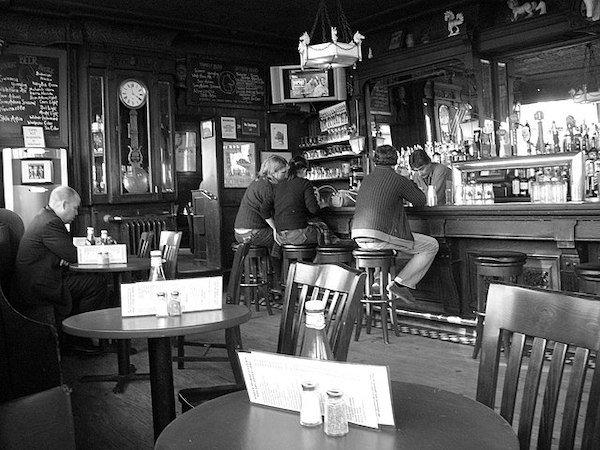
Six months in France, and then New York.
Yeah. I was in New York for the summer after school ended, and then I went to France in September and came back to New York in January of ’86.
You had day jobs to supplant your acting gigs.
Yes. I mostly did office work. Word processing, that kind of thing.
One of those was for an attorney. Did you have a favorite day job in those years?
The last one I had was the cushiest because it was only four hours a day, four days a week, and it was enough to pay my bills.
When you moved to New York, you lived in Manhattan?
Yeah, my girlfriend, who had left a year earlier, was a grad student at NYU, and she had an apartment on Bank Street in the West Village in 1986. A little studio.
You discovered the White Horse Tavern back then?
Yeah, that was right around the corner. Neither of us had any money at the time, so we weren’t going out a lot. In late ’87, I moved to Carroll Gardens and lived there for 20 years. You know, man, when you’ve got a good rent in New York, you’re not motivated to move.
When did you start with audio books?
In 1999. I had been auditioning for voiceover commercials for a year or two. I got a couple of things, but not a whole lot. A lot of auditions. Then my agent sent me on an audition for an audio book, and I got it. And once I got it, they kept me coming back.
Do you remember the title of your first book?
Yes, I do. It was a Western called Kinch, by Matt Braun.
At the same time, you voiced over a car commercial. “And you can leave your checkbook at home!”
That’s right. That got me my SAG card. That was a nice piece of change because they kept running it for a while. It was General Motors. Not just Chevy or Buick. It was all of them. Zero down payment. Zero whatever.
The audiobook experience. Fast forward to now. The audio book sales are up, pleasantly surprising to the industry. This is from December 2020, New York Times:
“Even though the number of people commuting has plummeted this year” — and they’re referencing people listening in their cars — “audio book revenue is up more than 17 percent over the same period in 2019, and eBook sales, which had been declining for the past several years, are up more than 16 percent.”
What attracts you as a reader of audio books to the medium?
I have to confess that I actually do not listen to audio books. I’ve listened to a couple just for education or entertainment. I do listen to podcasts now quite a bit. I prefer to read. I think for a lot of people it’s less exertion to listen, although for me, when I’m reading, I zone in and out, and I’m aware of zoning in and out, and I pick up where I left off. The recording does not stop for you to zone out. You have to go back, which is a hassle. It doesn’t seem, for me, to be a passive listening experience because you actually have to focus even more continually than you would reading. Paradoxically, maybe.
You do this as part of your livelihood. And what do you do for your relaxation? It’s like, what did Ebert do when he wanted to take a day off? Did he go to the movies?
You know, a busman’s holiday, maybe.
The sound of another voice: Tell me the centrality of sound to your experience. So much of what you do involves speaking and listening.
I think I need to approach it from a different angle. The thing I like about doing audio books — which is a different experience, obviously, than listening to audio books — is that I’m giving life to the world that the author has created. It’s like an actor’s dream: you’re basically playing every part in the play, including the stage directions, the narration. When I prepare the book, I’m taking notes on each of the characters so I know whatever the author’s told me — how old they are, what they look like, what the characters are like, how they speak — and then I decide in my mind what they look like, what they sound like, who they are.
And then, when I tell the story, I’m seeing the story in my mind. If I’ve prepared enough, I’m seeing it unfold and I’m hearing the distinct voices of all the characters and how they relate to each other. That is, hopefully, how the experience is translated to listener. Although the listener creates their own pictures in their mind, like any reader would. That, to me, is the key to it, not just with the sound of your voice but with the images in your mind. You express and transmit your picture of that world to the listener.
That’s brilliant.
It’s very freeing. Especially if the writing is good, I can bring myself to tears, I can make myself crack up. Obviously, I can’t do that in the recording. But if you’re really into it, you can really enter that world of the book.
The process
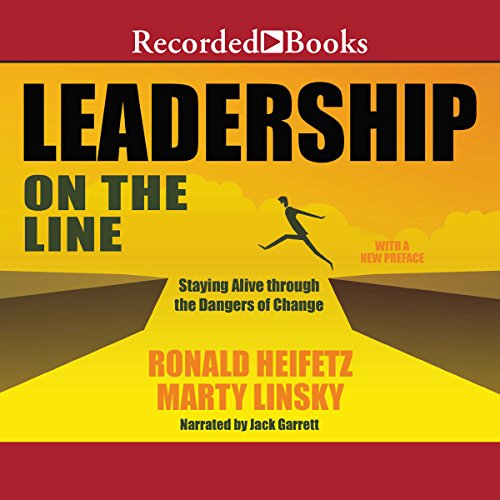
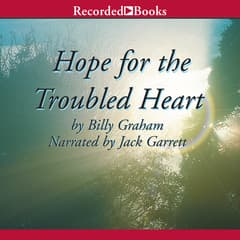
How does the process work? Do you get a list of books from which you can request a gig?
No. They just offer it to me. And the kind of books that I do, they’re often series of books. The same author will write a bunch of books using similar settings or characters. And so I might get all of those, which is a nice gig. They tend to cast according to genre. If somebody has done a lot of romances or sci-fi or whatever, then they’ll tend to give those books to them. So, sometimes I like to lobby for a little change of pace, so you don’t get stuck reading the same kind of thing all the time.
Yeah. That said, Westerns seem like your forte in your listing of books. And I’d say a major exception to that is Leadership on the Line by Ronald Haifetz and Marty Linsky and Angels by Billy Graham.
[laughter]
Yeah, I got a bunch of Billy Grahams at one point. And I used a pseudonym for those, but they didn’t always use the pseudonym. Lately, I’ve been doing fewer Westerns. I’ve been doing a lot more sci-fi, fantasy, and romances. I like Westerns because they can be fun. Those extreme characters. You can take chances with them.
A lot of opportunity to turn your voice into Kabuki theater.
[laughter]
I don’t know how that’s gonna play. I want people to know that.
Here’s you bio from Audio Bookstore:
“Jack Garrett’s voice is immediately recognizable from his work in commercials and as a personality on radio stations in the West and Southwest. In addition to guest appearances on television, he has performed in dozens of theater productions on regional and New York stages, including Guys and Dolls, Hallelujah Breakdown, Prelude to a Kiss, Cast a Spell, and Bongo Fever.”
You want to leave your theater work minimized in this interview?
My theater work is minimized period.
[laughter]
I don’t have to minimize it. Frankly, the audio books are my day job. A lot of people who do them have extensive theater and TV and even movie backgrounds, and I just don’t.
The Gaveltons
Now we get to “The Gaveltons.” In “The Gaveltons” you’re listed as Herbert Wagner.
[laughter]
Will the real Jack please stand up? For the love of God, who are you?
Yes, I insisted on that.
How many Gaveltons were there?
Maybe five or six. They’re all like 30 seconds, 60 seconds at most.
They’re so sweet. The only reason I bring it up is that when they’re listing the actors, it shows Herbert Wagner as Jack Gavelton, and you were Jack, right?
Yeah.
Were those fun?
Yeah, we shot all of those in two days in a warehouse in Greenpoint. That was fun. Actually, the guy who directed those went on to direct some films. At one point, he actually called me when I was still in Brooklyn and asked me to come out to L.A. and audition for something. I can’t remember if it was a movie. It might’ve been a commercial. If I’d gotten it, it could’ve lead someplace. I said no. He never called me again. When I moved to L.A., I tried to contact him, but no. Didn’t hear.
Same situation as your old sixth-grade buddy, who was just living in a bad address in L.A. You decided it wasn’t worth pursuing because you didn’t want to have to drive over to Van Nuys?
[laughter]
Ah, he’s fallen so far since fifth grade.
[laughter]
He was on top of the world.
[laughter]
Yonton's runway
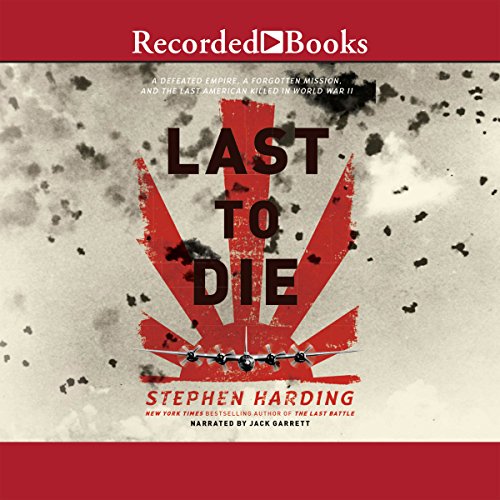
Okay. I have listened with joy and appreciation and intellection challenge and heartfelt reward for your work for many years now, and —
Thank you, Dad.
[laughter]
And now you’re grounded.
[laughter]
My gratitude for that. But I do believe I’ve found my favorite sentence ever from the lips of Jack Garrett. Ready?
“Seconds, later, her huge paddle-bladed propellers clawing the already-humid air, the B-32 began the sprint down Yontan’s runway.”
[laughter]
I said that?
Yeah. You’ve left so may golden nuggets along the trail that you can’t even remember. This is Last to Die: A Defeated Empire, a Forgotten Mission, and the Last American Killed in World War II. Stephen Harding. July 2015.
Wow. I don’t remember that at all. I made it sound pretty good. How did you happen upon that? You didn’t listen to the whole book, did you?
No. Prepping notes for our chat. You’re everywhere. Here’s your bio from Superstition Review that went along with a short story — “What Are You Doing?” — you placed there.
“Jack Garrett has worked in radio in Colorado and New Mexico and performed onstage in New York where he helped found a theatre company with other writers producing their original work. His fiction has appeared in The Literary Review, The New Orleans Review, Fugue, Natural Bridge, The Portland Review, The Santa Monica Review, Quarter After Eight, The Los Angeles Review, Monkeybicycle and Witness. He is also a voice actor and audiobook narrator.”
Tell me about those radio stations.
I was at two stations in Colorado Springs. The first was KKFM and then KXXV, I think it was, then they changed their call letters. Then I went up to Steamboat Springs and was at KFMU. I don’t know if these stations exist anymore. The first was AOR — album-oriented rock. They virtually told you every song and in what order. Then I went to a sort of a Top 40 rock station, and they changed that format to disco in 1977.
So, you were spinning Donna Summer hits?
Oh, yeah. “Bad Girls” and “Hot Stuff.” Also, “Ring my Bell.” “I Will Survive.” Also early rap, like “Rapper’s Delight” and “The Breaks.”
One fun thing I got to do there: I played a character, Dr. Byrum Upchuck. One thing they used to do on the AM side, they’d read every morning the school lunches for the local public schools. They’d publish that to tell kids what was going to be at the cafeteria that day. I came on as this old drunk guy called Dr. Byrum Upchuck, and I would read the school lunch menu and then I’d comment. Very disagreeably. “Chipped beef on toast again? Oh, my God.”
[laughter]
And I got a bit of a following from that. I wish I had those tapes.
You went from Rick Tragic to Byrum Upchuck.
I went from Rick Tragic to Rick Garrett, and then I went to Jack Garrett because there was already a Rick. And then Byrum Upchuck was just a sideline, a character that I used a general voice for.
You change your name like I change my socks, man.
I hope you change your socks a little more often than that.
Color blindness

When I was a kid in Kansas City, there was KPRS, Kansas City’s Peoples Radio Station. When I was working summers, helping refurbish houses for my dad, the team played that all the time, so I basically grew up listening to KPRS every summer. And the number one DJ was a guy who used to be in my Hebrew School carpool. The whitest Jewish guy you’d ever met. He was just cool. He sounded cool. He didn’t hyperextend any accent or anything. So, in some sense, radio is color blind and encourages you to fill in the visual narrative. That’s how we started this conversation. I like that. It’s not a perfect world, but it comes really close. Radio is a cool medium. It helps you create a play-along-at-home scenario.
Yeah, I’ll have to take issue with you on that.
Tell me how.
Well, first of all, color blindness is a myth, whether it’s audio or visual. And second of all, while I know that there’ve been a lot of popular white disc jockeys on black stations, the main reason for that is because black people have been excluded from actually working on radio stations. So, while I understand that it’s natural to want harmony among the races, it can’t be without acknowledging the injustices and discriminations that continue to happen to this day and even continually try to be swept under the rug under the guise of so-called color blindness.
Yeah, I hear that. Well, once again, I admire your ability to be so eloquent and so wrong at the same time.
[laughter]
The third guy

You were on The Jon Stewart Show?
You remember, Jon Stewart had a show before he had a show. On MTV. Part of that show had sketches that were filmed separately. And this was a sketch where one of the actors had seen my stuff and invited me over to be in a sketch they were filming. It was a Presidents’ Day sketch. It was filmed in an old tavern in the West Village. The setting could have been from the 1800s, all dark wood and shit. And we were all dressed up as Founding Fathers: powdered wigs and silly outfits, like Washington and Jefferson. And we were ad-libbing these dumb public service announcements.
I don’t even remember what we said. It was supposed to be funny stuff, though. I think I was just an extra. I don’t remember saying a word. And I don’t remember ever actually seeing it on the air because I don’t think I had cable. But what I remember about that is that one of the guys was — and this was before he got much work — oh, shit, now I’m gonna forget his name. Did you see “O Brother, Where Art Thou”?
Yep.
It was the third guy. Not Turturro, and not Clooney. But the other guy.
Oh, yeah. He did “Leaves of Grass.”
He was in “The Battle of Buster Scruggs,” too, that just came out last year.
Yeah, yeah, yeah. Give me a second…Tim Blake Nelson.
Yeah. Yeah, yeah. Tim Blake Nelson. He was ad-libbing like crazy, and he was writing shit down, and he was really hustling. And he was really good. He was smart. I thought, Man, this guy is really trying hard. And, of course, he knew what he was doing. He was smart and he was talented. He’s a great actor, actually. Do you ever listen to the Marc Maron podcast?
Yeah.
He was on there. And he has a really interesting background. He’s Jewish and he’s from Tulsa, Oklahoma. He grew up in that kind of environment. Really interesting story.
Did you see “Leaves of Grass”?
No.
He wrote and directed it. He’s in it. Edward Norton plays twin brothers. One’s a professor of philosophy on the East coast. The other’s a drug dealer. The professor comes down to Oklahoma. I love this movie.
You want to hear my new joke?
Sure.
A fart wafts into a bar.
[silence]
That’s the whole joke.
I’m sorry. Say again?
A fart wafts into a bar.
[pause]
Did you say “wafts”?
Yes.
[laughs]
I missed that.
And I Googled it, and it doesn’t exist, in or outside of quotations. I invented that joke. That joke is mine.
Dude. Get some money out of that.
Have a donut
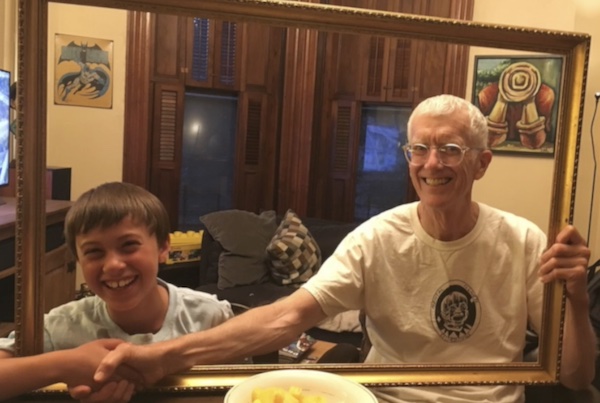
Give me nuts and bolts. What kind of equipment do you use for reading a book?
Well, I’m in the other side of the booth.
So, a microphone and a pop filter.
Yeah. And that’s it. And I read off an iPad. It’s a very good mic. It has to be because it has to be very quiet. The software is Pro Tools, a fairly common program used for recording now. Luckily, I don’t have to do any of that. It’s the other side.
So, it’s you and an engineer on the other side of a soundproof room?
The narrator sits in a booth, basically, with soundproof walls, in the dark there. It’s fairly easy-peasy. Take breaks every so often. Have a donut.
Do you read the entire book before you record it?
Yes.
Can you knock out a book in one or two sessions, depending on how long it is?
Not in one session, no. You have to take a lot of notes. First, you go through and make a word list of any proper names, place names, that you don’t know but you can’t find in the dictionary yourself. You make a list of those, and there’s a research department at Recorded Books. You send that to them ahead of time so that they can look it up and have it ready to go.
Do they ask the authors their preferences on pronunciation?
Yeah, especially if it’s a made-up word. A lot of sci-fi and fantasy books have made-up words and made-up language. So, you have to ask the author. Which is a pain for them, but it’s also a pain to try to figure out and pronounce. It takes a while. It’s work. And you only get paid for the recorded hours.
Does it make you nervous that one of those aliens will actually come down and be offended by how you’ve characterized their voice and personality?
Yes. Definitely. And I think I’ve already been pre-visited in the form of vinegaroons. And some day I fear waking up being wrapped in some weird cocoon.
[laughter]
Just to put this in context, we spoke on a Saturday after that happened in D.C. [the attempted insurrection] And this conversation is such a recuperative time away from the madness of the political landscape.
Let me just say this. I am optimistic and I do have hope that Kim and Kanye will get back together. Because they were made for each other.
That’s good. I like your positive vision for the future of the cultural landscape of America, Jack.
Well, you know. You gotta be. It’s the patriot’s way.
And if that woman from the parking lot in New Mexico is still alive?
I guess I can’t answer my door for a while.
May 31, 2021
Interviewed by Hal Klopper

